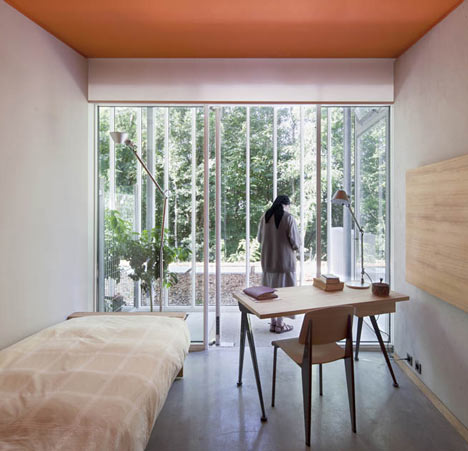
Ronchamp Tomorrow by Renzo Piano
Renzo Piano Building Workshop has completed a monastery built into the side of a hill at the site of Le Corbusier's chapel of Notre-Dame du Haut in Ronchamp.

The monastery comprises twelve concrete living units for the resident community of Poor Clare nuns, plus communal areas, an oratory and a visitor's lodge.
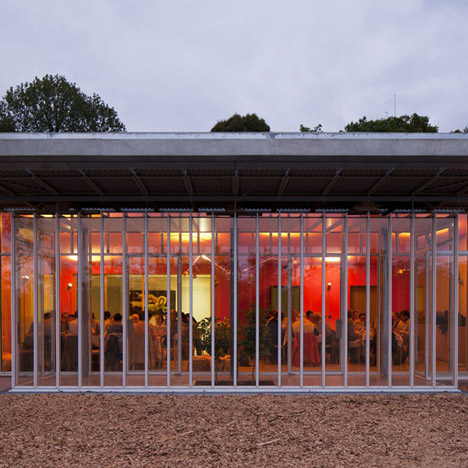
The living units are set into the hillside in small clusters and have their own individual winter gardens.
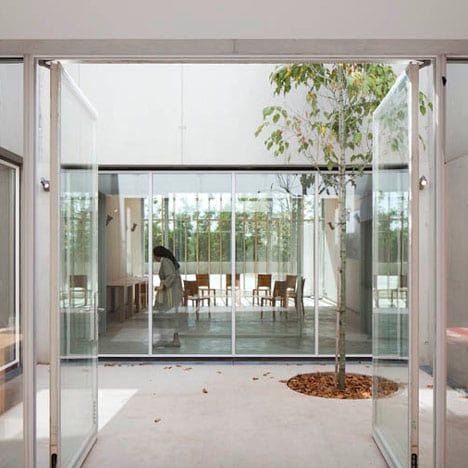
Piano has collaborated with landscape designer Michel Corajoud to ensure the buildings blend seamlessly with the surrounding environment and do not detract from Le Corbusier's chapel.
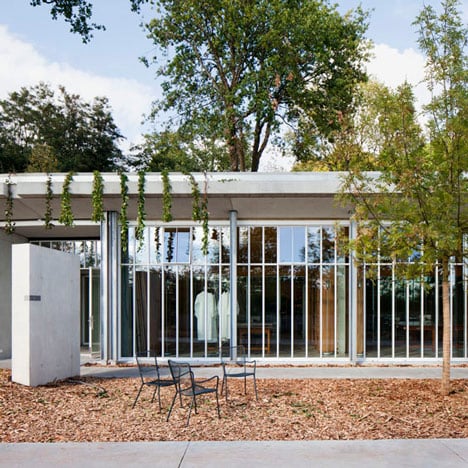
The gatehouse is embedded in the slope of the hill and features a ticket office, shop, bioclimatic garden, meeting room and archive housed behind a glazed façade.
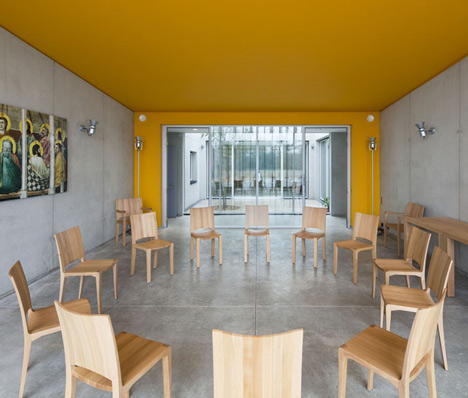
A palette of concrete, zinc and wood has been applied to the interior spaces to create a contemplative environment and link the buildings to their surroundings.
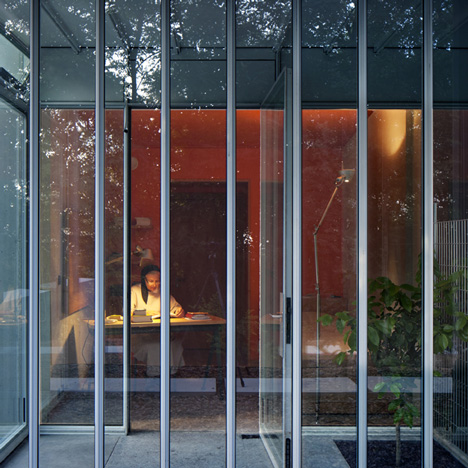
Photography is by Michel Denancé.
Here is some more information from the architects:
Renzo Piano Building Workshop
The Project
The scope of the project is to create a peaceful environment, whose quiet and discreet beauty highlights and complements the chapel, while at the same time enhancing existing facilities for visitors’ reception. Immersed in the lush vegetation of the Bourlemont hill, the monastery is a place “of silence, prayer, peace and joy”, where everything contributes to spiritual contemplation.
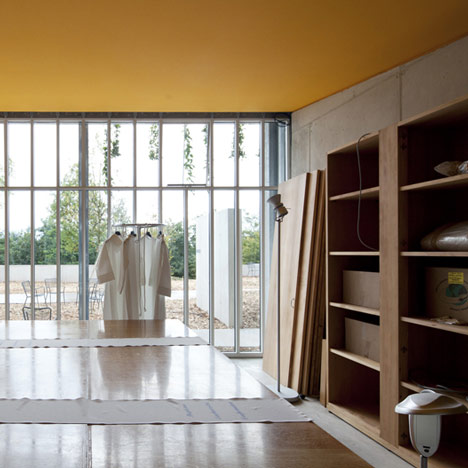
The project includes three main items: the gatehouse, the nunnery, and the landscape.
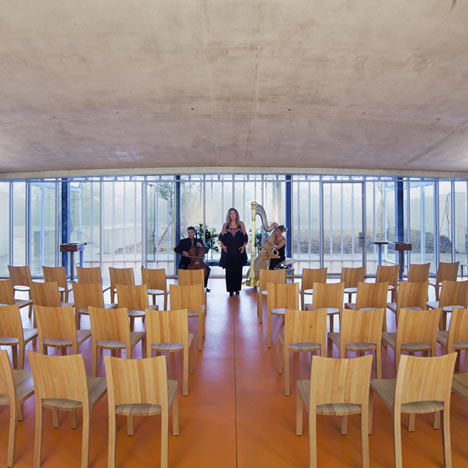
The Gatehouse
In order to enhance the existing visitors’ facilities, the original gatehouse has been replaced with a new more functional building that houses a ticket office, corner shop, bioclimatic garden and a meeting room, along with administrative spaces. Part of the building is also dedicated to the research and conservation of the archives.
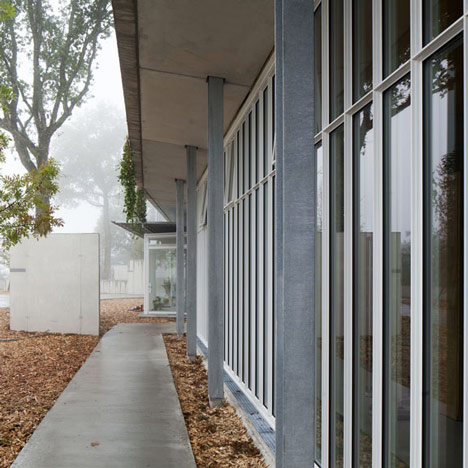
Cut into the slope of the hill the new gatehouse merges within the surrounding landscape. It features a large glazed façade that opens to the visitors arrival area and parking.
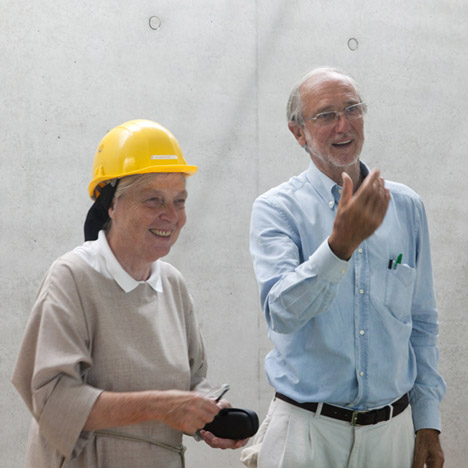
The Monastery
The monastery is composed of twelve domestic units for the sisters with spaces for common living (refectory and workshops), an oratory for religious pilgrims, and a lodge to host visitors in search of quiet and spiritual rest.
The rooms are small independent concrete units that are set into the hillside (2,70m x 2,70m). They are positioned in clusters that gently slope down the west side of the hill offering a cleared view of the valley thereby establishing a relationship with the community. Simple and spare, they are each given an individual winter garden, a space entirely dedicated to contemplation.
The oratory is conceived as part of the monastery. Positioned off the chapel’s site, it is embedded into the slope of the hill, creating a harmonious space with the chapel and the site. The oratory aims at being a place of communion open to pilgrims of all communities.
The building palette for the complex is simple: concrete, zinc, and wood to create an environment propitious to meditation.
The following photos, sketches and plans are all copyright Renzo Piano Building Workshop.
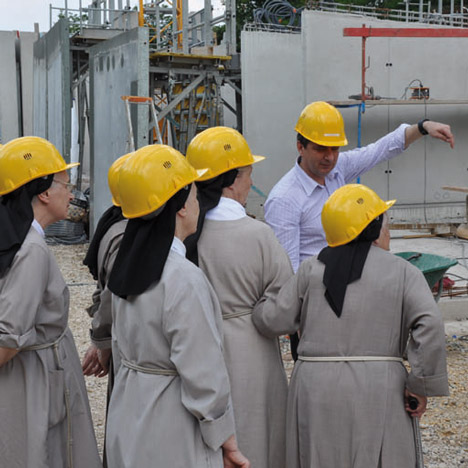
The environment
Nature also plays a fundamental role in the project, highlighting the sacred and remote aspect of the site.
Preservation of the existing vegetation and forestation of the slopes helps create a sense of unity and sacredness throughout the design.
The project has been conceived taking into consideration all environmental procedures possible to reduce energy consumption.
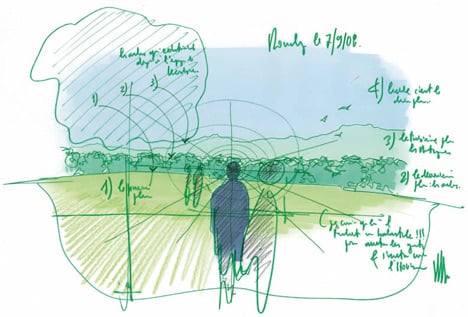
The Chapel at Ronchamp
The Chapel of Notre-Dame du Haut (Our Lady of the Height) overlooks the small town of Ronchamp from the hill of Bourlémont. It was built by one of the twentieth century’s most famous architects, Le Corbusier.
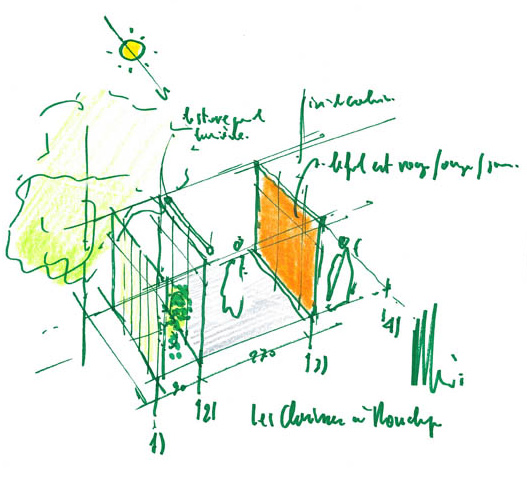
Marian pilgrimage place centuries, it opens to the four horizons as a space 'of silence, of prayer, of peace; of inward joy' in the words of the architect Le Corbusier.
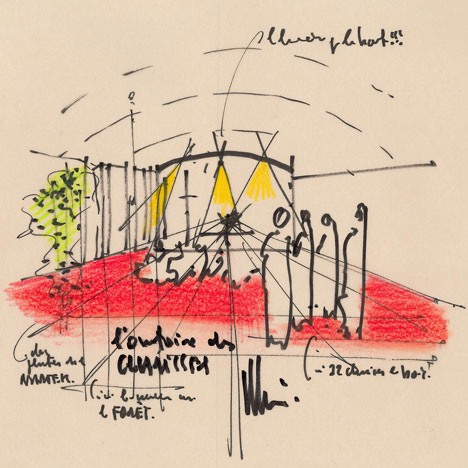
Site history
Since the middle ages, the 8th of September, day of the Nativity of the Virgin Mary, the Chapel welcomes pilgrims ; the chapel belonged to the Church as property of the parish of Ronchamp. During the French Revolution in 1789 it was sold as a property of the state to a merchant.
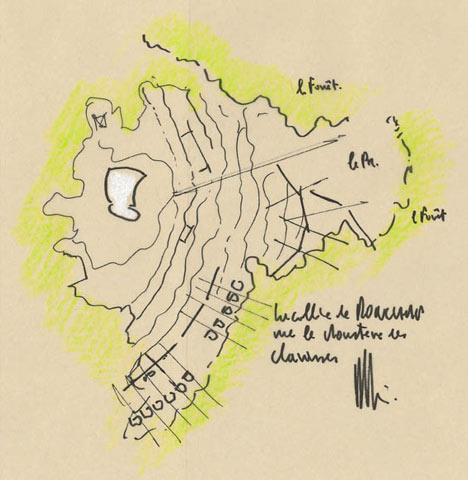
A few years later, about forty families and Ronchamp‟s priest decided to buy the edifice back in order to restore it to its initial function: a chapel dedicated to the cult of the Virgin Mary, and also a pilgrimage site to which the local people were still very attached.
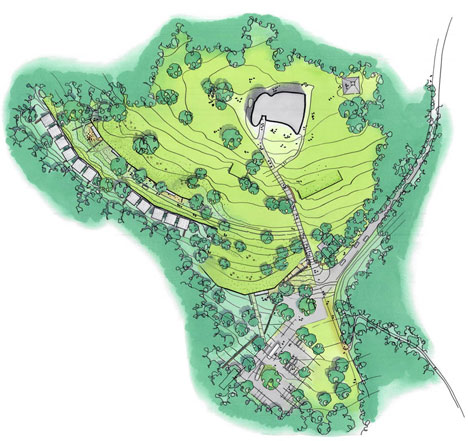
Thus, an almost unique and exceptional, the Chapel became private property, although of all of these families. Today, the heirs form the Association based on the law 1901, with regard to ownership of the site, the buildings and the image of the Chapel, in accordance with Le Corbusier’s written will.
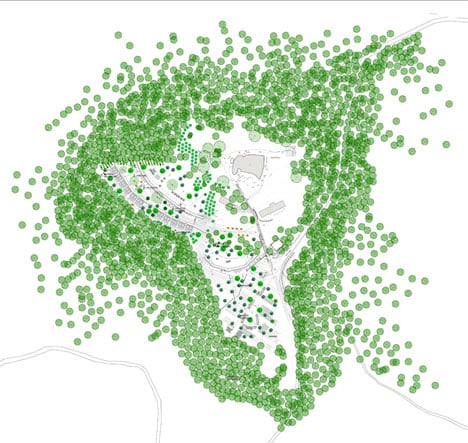
The construction of Le Corbusier
During the liberation of Ronchamp in October 1944, the edifice was partially destroyed by artillery. The Besançon-based Diocesian Commission for Sacred Art („Commission diocésaine d‟Art Sacré‟ – „CDAS‟) it proposes to Le Corbusier’s reconstruction; Le Corbusier hesitate then affected by the site (its landscape, its human history and the fervor of its inhabitants) it undertakes to rebuild a building with the stones of the old chapel and a cloak of white-washed reinforced-concrete. “Notre-Dame du Haut” out of the ground in 1955.
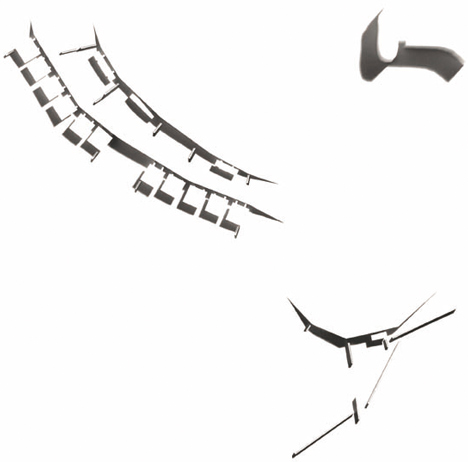
“Ronchamp Tomorrow” project
Launched at the fiftieth anniversary of the Chapel in 2005, a refection on the future of the site has identified the need to support more visitors to the site.
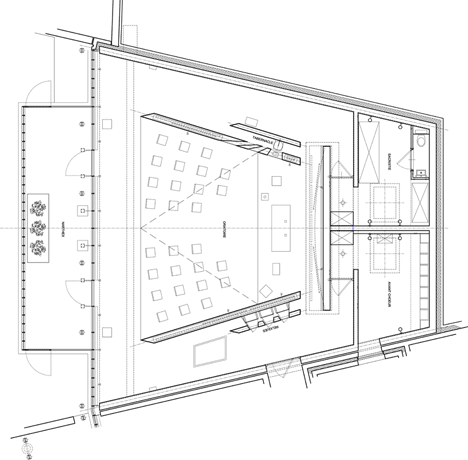
Click above for larger image
Silence, peace found again and getting back to nature are at the heart of the “Ronchamp Tomorrow” project. Three complementary construction sites have been launched with the Renzo Piano Building Workshop together with the landscape designer Michel Corajoud, to allow visitors to the chapel of Notre-Dame du Haut, both pilgrims and lovers of architecture, to find on the site the serenity they need to take in to the fullest the work of Le Corbusier.
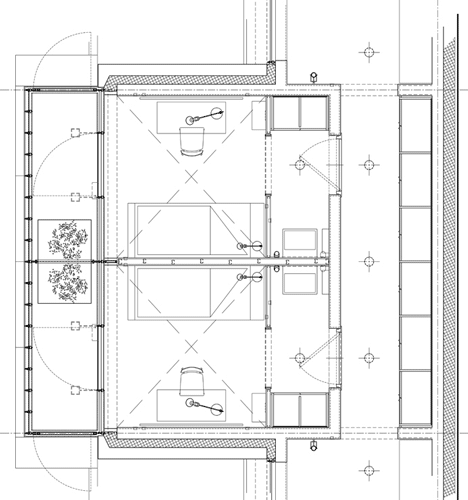
Click above for larger image
The Chapel’s Gatehouse
As a replacement to the current reception building: Renzo Piano will build a new Gatehouse for visitors that is more balanced, spacious, open to culture, architecture and the sacred. It will also be the new headquarters of AONDH.
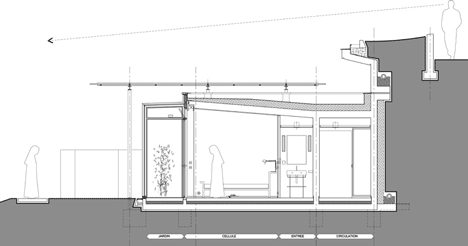
Click above for larger image
The convent for the Community of Poor Clares
This will consist of small living and work units for a community of a dozen international Poor Clares on the backside of the site; an oratory, and a place to stay, a spiritual retreat, will be open to all. Renzo Piano will bring the ensemble to life in a discrete way.
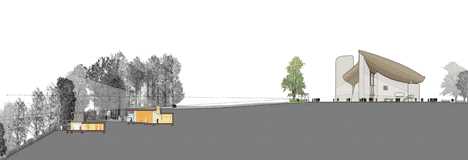
Click above for larger image
The landscape
The hill has been taken care of for more than 50 years but the trees today need to be treated, some replanted; the landscape architect Michel Corajoud plans replanting, remodelling some of the landscape spaces and a landscaped parking area, employing the standards of sustainable development and in the respect the environment.